In a world increasingly focused on sustainability, businesses must prioritize energy efficiency. In today’s competitive landscape, organizations must reduce costs while meeting sustainability goals. One of the most effective ways to achieve this is through mechanical engineering designed for energy efficiency. HVAC and pumping systems are vital to this goal. Understanding how mechanical engineering design enhances these systems can lead to significant energy savings and improved operational performance.
Understanding HVAC and Pumping Systems
1. HVAC Systems
HVAC stands for Heating, Ventilation, and Air Conditioning. These systems regulate indoor climate by controlling temperature, humidity, and air quality. Key components include:
- Heating: Warms indoor spaces using furnaces or heat pumps.
- Ventilation: Ensures proper air circulation by removing stale air and bringing in fresh air.
- Air Conditioning: Cools indoor spaces to maintain comfort during hot seasons.
Effective HVAC systems enhance energy efficiency by utilizing advanced technologies like smart thermostats and variable speed motors. These innovations ensure optimal performance while reducing energy costs.
2. Pumping Systems
Pumping systems are essential for transporting fluids, such as water or chemicals, from one location to another. They are critical in various applications, including:
- Water Distribution: Supplying water for drinking, irrigation, and industrial processes.
- Cooling Systems: Circulating water in HVAC systems for cooling purposes.
- Industrial Processes: Moving fluids in manufacturing and chemical processing.
Efficient pumping systems use high-efficiency pumps and variable frequency drives to minimize energy consumption. This results in reduced operational costs and ensures reliable performance across different industries.
The Impact of Mechanical Engineering on Energy Efficiency
Mechanical engineering form the backbone of industrial and commercial operations. They regulate temperature, ensure ventilation, circulate fluids, and provide critical support for daily processes. Efficient design ensures these systems consume less energy while maintaining performance.
Without effective mechanical works, organizations face higher energy bills, frequent equipment breakdowns, and greater environmental impact. Optimized systems, on the other hand, enable consistent performance, delivering measurable improvements in energy efficiency.
The Role of HVAC Systems in Energy Efficiency
HVAC systems are essential for maintaining a comfortable indoor environment. When designed and maintained effectively, these systems contribute to energy efficiency in several ways:
1. Advanced Technologies
Modern HVAC systems utilize energy-efficient components such as variable speed motors and smart thermostats. These innovations help minimize energy consumption and reduce costs.
2. Improved Indoor Air Quality
Proper ventilation and air circulation enhance air quality, leading to healthier indoor environments. Improved air quality boosts employee productivity and reduces health-related absenteeism.
3. Temperature Control
Maintaining optimal temperatures is crucial for various industries. Efficient HVAC systems ensure products, especially perishable goods, are kept within required temperature ranges, preventing waste.
HVAC Systems: Enhancing Comfort and Efficiency
1. Reducing Energy Demand
HVAC systems consume a large share of building energy. Incorporating modern mechanical works like variable refrigerant flow systems and demand-controlled ventilation significantly enhances energy efficiency by matching energy use with real needs.
2. Indoor Air Quality and Productivity
A well-designed HVAC system ensures clean, temperature-controlled air. Employees working in comfortable environments are more productive, and optimized mechanical works improve workplace conditions while supporting energy efficiency.
3. Smart Automation and Maintenance
HVAC systems with automated controls and predictive maintenance features reduce unnecessary energy consumption. These mechanical works adapt to changes in occupancy and conditions, boosting energy efficiency across operations.
Pumping Systems: Driving Hidden Efficiency Gains
1. Optimizing Water Distribution
Pumping systems handle water supply, cooling, and industrial processes. With high-efficiency pumps and variable frequency drives, mechanical works improve energy efficiency by reducing wasted power.
2. Reliability for Critical Operations
In industries such as manufacturing, agriculture, and healthcare, pumping failures can disrupt operations. Efficient mechanical works ensure system reliability, minimize downtime, and maintain consistent energy efficiency.
3. Sustainability Through Pumping Systems
Energy-efficient pumps reduce both operational costs and environmental impact. By cutting energy use, these mechanical works contribute directly to corporate sustainability and improved energy efficiency.
The Impact of Pumping Systems on Energy Efficiency
Pumping systems are critical for transporting fluids in various applications. Their efficiency directly impacts energy efficiency in several significant ways:
- Energy Consumption Reduction: High-efficiency pumps consume less energy compared to traditional models. Upgrading to these systems can lead to substantial energy cost savings over time.
- Minimized Downtime: Efficient pumping systems are less prone to failures. Regular maintenance and monitoring ensure these systems run smoothly, reducing interruptions and associated costs.
- Versatility Across Industries: From agriculture to manufacturing, pumping systems adapt to diverse needs. Their flexibility allows businesses to streamline operations and enhance productivity.
Integration of HVAC and Pumping Systems for Energy Efficiency
1. Centralized System Management
By integrating HVAC and pumping systems into building management platforms, businesses achieve seamless control. This integration ensures mechanical works operate together, maximizing energy efficiency.
2. IoT and Smart Sensors
IoT-enabled sensors allow real-time monitoring and automated adjustments. These smart mechanical works prevent unnecessary energy use, enhancing both performance and energy efficiency.
3. Maintenance and Performance Optimization
Connected systems make predictive maintenance possible. Addressing issues before breakdowns ensures mechanical works remain reliable while sustaining long-term energy efficiency.
Best Practices for Energy Efficiency in Mechanical Works
- Conduct Energy Audits: Identify inefficiencies in HVAC and pumping systems to guide strategic upgrades.
- Invest in Modern Equipment: Upgrade to high-efficiency pumps, fans, and motors for improved energy efficiency.
- Adopt Smart Automation: Use advanced controls to optimize system performance and minimize energy waste.
- Perform Regular Maintenance: Preventive care ensures mechanical works consistently deliver peak energy efficiency.
- Train Facility Managers: Equip teams with knowledge to operate systems effectively and sustainably.
The ROI of Energy-Efficient Mechanical Works
Investing in modern mechanical works offers significant returns. Energy-efficient HVAC and pumping systems reduce energy bills, extend equipment life, and minimize costly downtime. Over time, these savings far outweigh initial costs. Businesses gain financial benefits while improving their environmental footprint through enhanced energy efficiency.
Industry Examples of Energy Efficiency Through Mechanical Works
- Healthcare Facilities: Rely on advanced HVAC systems for clean air and comfort. Efficient mechanical works ensure reliable performance and reduced energy consumption.
- Manufacturers: Use optimized pumping systems to support processes. Improved designs reduce energy use while sustaining productivity.
- Commercial Buildings: Implement smart HVAC controls for cost savings and occupant comfort, proving how mechanical works drive energy efficiency.
Sustainability Benefits of Mechanical Engineering
Sustainability is no longer optional for modern businesses. By adopting energy-efficient mechanical works, organizations reduce greenhouse gas emissions while cutting energy costs. These improvements support environmental responsibility and compliance with green building standards. When businesses design mechanical systems with energy efficiency in mind, they achieve both financial and ecological benefits.
Partnering with Experts for Energy Efficiency Success
Designing and maintaining efficient mechanical works requires specialized expertise. At SelteQ Engineering, we provide tailored HVAC and pumping solutions that enhance performance, reduce costs, and maximize energy efficiency. Our expertise ensures your mechanical systems deliver sustainable results, enabling businesses to remain competitive while meeting energy-saving goals.
SelteQ Engineering offers the technology, tools, and expertise to keep your mechanical works optimized for long-term success. Take the first step today and partner with us and unlock the full potential of energy efficiency in your operations.

